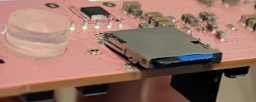Here is a snippet of verilog code - a simple command decoding module and block ram. It get 32 bit command by rx_data and if the command is memory write, then next command is memory value to store - e.g. command 3100_0004, CAFE_BEEF, 1234_5678 will store CAFE_BEEF, 1234_5678 at block ram address 0x0004.
module top_nerves
#( parameter integer CMD_MEM_ADDR_WIDTH = 8
) (
...
input [31:0] rx_data,
input rx_valid,
output rx_ready,
...
);
wire [23:0] mem_addr;
wire mem_wstrb;
wire [31:0] mem_wdata;
wire mem_wready;
wire [31:0] mem_rdata;
wire mem_rstrb;
wire mem_rbusy;
cmd_decoder
cd(
.clk(clk),
.rst_n( rst_n ),
.rx_data( rx_data ),
.rx_valid( rx_valid ),
.rx_ready( rx_ready ),
...
.mem_addr( mem_addr ),
.mem_wstrb( mem_wstrb ),
.mem_wdata( mem_wdata ),
.mem_wready( mem_wready ),
.mem_rdata( mem_rdata ),
.mem_rstrb( mem_rstrb ),
.mem_rbusy( mem_rbusy ),
.io_out( cmd_io_out )
);
bram_32bits #(
... )
cmd_mem (
.clk( clk ),
.waddr( mem_addr[CMD_MEM_ADDR_WIDTH-1:2] ),
.wdata( mem_wdata ),
.wenable( mem_wstrb ),
.raddr( mem_addr[CMD_MEM_ADDR_WIDTH-1:2] ),
.rdata( mem_rdata )
);
endmodule
module cmd_decoder (
input [31:0] rx_data,
input rx_valid,
output reg rx_ready,
...
output reg [23:0] mem_addr,
output reg mem_wstrb,
output reg [31:0] mem_wdata,
input mem_wready,
input [31:0] mem_rdata,
output reg mem_rstrb,
input mem_rbusy,
);
...
localparam
CMD_MEM_WRITE = 4'h3,
...
;
reg [3:0] state;
reg [31:0] data;
wire [3:0] cmd;
assign cmd = data[31:28];
reg [3:0] cur_cmd;
always @( posedge clk or negedge rst_n ) begin
...
case (state)
FETCH : begin
if (rx_valid) begin
data <= rx_data;
...
end
end
LOAD : begin
cur_cmd <= cmd;
case (cmd)
CMD_MEM_WRITE : begin
word_count <= data[27:24] + 1;
mem_addr <= data[23:0] - 4;
state <= DONE;
end
...
endcase
MEM_WRITE : begin
if( mem_wready == 1 ) begin
mem_addr <= mem_addr + 4;
mem_wstrb <= 1;
mem_wdata <= data;
word_count <= word_count - 1;
state <= DONE;
end
end
...
endcase
end
end
Now when run synthesizing, two missings noted.
- 8 bits of rx_data is missing. [31:0] is mapped to [23:0]. The first 4 bits is for command and second 4 bits for word count.
- mem_wdata is not connected between cmd_decoder and bram. Code has "mem_wdata <= data;" which should connect mem_wdata to bram.
The first puzzle is just wrong assumption that the [31:24] of [31:0] must be removed and mapped to [23:0]. What removed is the address not used - from [23:16] of [31:0]. When hovering over the ... like below, those optimization was revealed.
Second puzzle is from the unassigned wire. The bram in here is such that the mem_wready is not necessary but the top_nerves.v defined it anyway and assigned it. And optimization figured it out that mem_ready will be 0 always and it removes statements inside.
module cmd_decoder (
...
MEM_WRITE : begin
if( mem_wready == 1 ) begin // mem_wready is 0 always
... // optimization just ignore this part completely.
end
end
When put 1 to the wire value, then mem_wdata is correctly synthesized.
module top_nerves
...
cmd_decoder
cd(
...
.mem_addr( mem_addr ),
.mem_wstrb( mem_wstrb ),
.mem_wdata( mem_wdata ),
.mem_wready( 1 ),
...
Sometimes, the job of programmer is to understand what other program is generating before writing own program.



